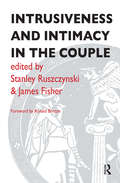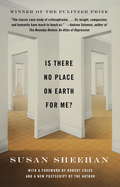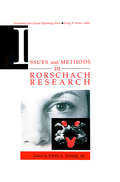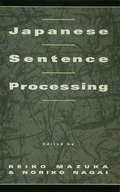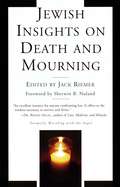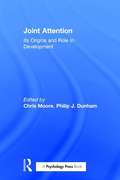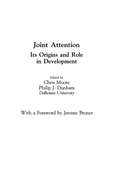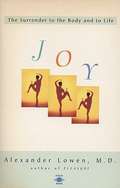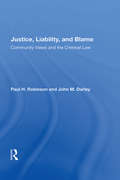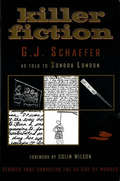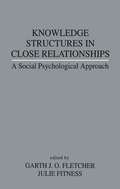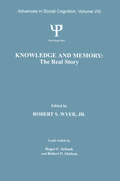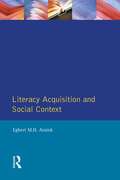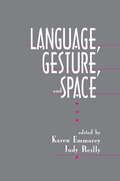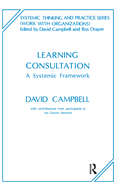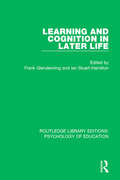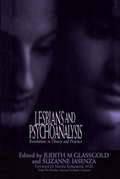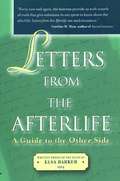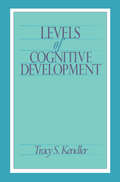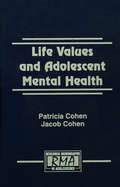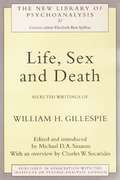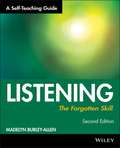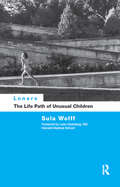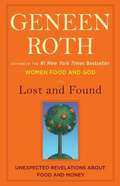- Table View
- List View
Intrusiveness and Intimacy in the Couple
by James Fisher Ronald Britton Stanley RuszczynskiA collection of papers, largely based on clinical work, which covers a range of concepts and mechanisms which are central to any psychoanalytic psychotherapy with children, adolescents, or adults. It addresses an issue which lies at the heart of human relationships, that of intimacy.
Is There No Place on Earth for Me
by Robert Coles Susan SheehanThis renowned journalist's classic Pulitzer Prize winning investigation of schizophrenia--now reissued with a new postscript--follows a flamboyant and fiercely intelligent young woman as she struggles in the throes of mental illness."Sylvia Frumkin" was born in 1948 and began showing signs of schizophrenia in her teens. She spent the next seventeen years in and out of mental institutions. In 1978, reporter Susan Sheehan took an interest in her and, for more than two years, became immersed in her life: talking with her, listening to her monologues, sitting in on consultations with doctors--even, for a period, sleeping in the bed next to her in a psychiatric center. With Sheehan, we become witness to Sylvia's plight: her psychotic episodes, the medical struggle to control her symptoms, and the overburdened hospitals that, more often than not, she was obliged to call home. The resulting book, first published in 1982, was hailed as an extraordinary achievement: harrowing, humanizing, moving, and bitingly funny. Now, some two decades later, Is There No Place on Earth for Me? continues to set the standard for accounts of mental illness.
Issues and Methods in Rorschach Research
by John E. ExnerAny research that involves the use of the Rorschach or focuses on the nature of the Rorschach must be framed in the context of the basic principles that mark any scientific investigation. However, most texts concerning research design or data analysis do not deal directly with many of the unusual issues that confront investigators who use the Rorschach in their research. The nature of the test and test procedures are somewhat different than for most psychological tests, and, often, these special characteristics become critical when research designs are formulated. Similarly, some of the data of the tests are quite different from the customary distributions yielded by other psychological tests. Thus special care must be exercised when considering the variety of tactics that might might be used in analyzing the test data. This text is unique in that it is specific to the Rorschach. Bringing together experts on Rorschach research, this volume presents in-depth treatments of every facet of methodology -- from design to analysis -- as well as more conceptual issues. It is designed to aid investigators in contending effectively with the many difficult challenges that are often encountered in Rorschach research. This work adds to the information already available to the accomplished researcher as well as provide some enlightenment for the Rorschach research novice. It dispels the notion that rote methodology or analyses can be applied routinely to studies involving the Rorschach. And it helps to improve the quality of investigations in which the test is included, and contribute in some way to the improvement of the overall research yield in the Rorschach community.
Japanese Sentence Processing
by Reiko Mazuka Noriko NagaiThis volume is a direct result of the International Symposium on Japanese Sentence Processing held at Duke University. The symposium provided the first opportunity for researchers in three disciplinary areas from both Japan and the United States to participate in a conference where they could discuss issues concerning Japanese syntactic processing. The goals of the symposium were three-fold: * to illuminate the mechanisms of Japanese sentence processing from the viewpoints of linguistics, psycholinguistics and computer science; * to synthesize findings about the mechanisms of Japanese sentence processing by researchers in these three fields in Japan and the United States; * to lay foundations for future interdisciplinary research in Japanese sentence processing, as well as international collaborations between researchers in Japan and the United States. The chapters in this volume have been written from the points of view of three different disciplines, with various immediate objectives -- from building usable speech understanding systems to investigating the nature of competence grammars for natural languages. All of the papers share the long term goal of understanding the nature of human language processing mechanisms. The book is concerned with two central issues -- the universality of language processing mechanisms, and the nature of the relation between the components of linguistic knowledge and language processing. This volume demonstrates that interdisciplinary research can be fruitful, and provides groundwork for further research in Japanese sentence processing.
Jewish Insights on Death and Mourning
by Jack RiemerThis collection of Jewish reflections on issues of death and dying make this an indispensable resource for coping with some of life's most difficult moments.
Joint Attention: Its Origins And Role In Development
by Chris Moore Philip J. DunhamJoint attention to objects and events in the world provides the initial means whereby infants can start to share experiences with others and negotiate shared meanings. It provides a context for the development of both knowledge about the world and about others as experiencers. It plays a central role in the development of the young child's understanding of both the social and nonsocial worlds and in the development of the communicative interplay between child and adult. This volume explores how joint attention first arises, its developmental course, its role in communication and social understanding, and the ways in which disruptions in joint attention may be implicated in a variety of forms of abnormal development including autism.
Joint Attention: Its Origins and Role in Development
by Jerome Bruner Chris Moore Philip J. DunhamIt is perhaps no exaggeration to suggest that all of what is intrinsically human experience is grounded in its shared nature. Joint attention to objects and events in the world provides the initial means whereby infants can start to share experiences with others and negotiate shared meanings. It provides a context for the development of both knowledge about the world and about others as experiencers. It plays a central role in the development of the young child's understanding of both the social and nonsocial worlds and in the development of the communicative interplay between child and adult. The first devoted to this important topic, this volume explores how joint attention first arises, its developmental course, its role in communication and social understanding, and the ways in which disruptions in joint attention may be implicated in a variety of forms of abnormal development including autism.
Joy: The Surrender to the Body and to Life
by Alexander LowenDr. Alexander Lowen believes that the key to personal change is contact with the body. This book rests on the idea that joy is a natural state, a positive feeling of the body, possible only through surrender to the body by listening to its wisdom and what it communicates. The book reviews the essentials of bioenergetic therapy in the light of other therapeutic approaches, and teaches how to surrender to joy by using bioenergetic principles. It discusses aggression, disappointment, sexual abuse, the fear of dying and issues of spirituality as it attempts to make joy a more common experience.
Justice, Liability, And Blame: Community Views And The Criminal Law
by Paul H. RobinsonThis book examines shared intuitive notions of justice among laypersons and compares the discovered principles to those instantiated in American criminal codes. It reports eighteen original studies on a wide range of issues that are central to criminal law formulation.
Killer Fiction
by Colin Wilson G. J. Schaefer Sondra LondonIncluding a foreword by a woman who once dated him, the perverse, violent stories, poetry, and fantastic scribblings of a man convicted in 1972 of murdering two women chart the killer's extreme pathology.
Knowledge Structures in Close Relationships: A Social Psychological Approach
by Garth J. O. Fletcher Julie FitnessThirty-three of the top scholars in this fast moving domain present a picture of work at the cusp in social psychology -- work that deals with cognition and affect in close relationships. The present volume contains a wealth of research findings and influential theoretical accounts that spring as much from indigenous work in the close relationship field as from purebred social cognition. The chapters introduce theories and research programs concerned with the role of individual and couple differences in close relationship knowledge structures. They deal with the role of emotion and affect in close relationships. And they discuss the function of cognition and knowledge structures in relation to the developmental course of close relationships. Each section is accompanied by a critical review written by an expert in the field. This volume is a must for any close relationship scholar interested in the latest research and theorizing about close relationships that adopt a social psychological perspective. It will also be of interest to scholars and students working in clinical psychology, social cognition, communication, individual differences, and family studies.
Knowledge and Memory: Advances in Social Cognition, Volume VIII (Advances in Social Cognition Series)
by Robert S. Wyer Robert P. Abelson Roger C. SchankNarrative forms of mental representation and their influence on comprehension, communication and judgment, have rapidly become one of the main foci of research and theory in not only psychology but also other disciplines, including linguistics, sociology, and anthropology. No one has been more responsible for the awakening of interest in this area than Roger Schank and Bob Abelson. In their target article, they argue that narrative forms of mental representation, or "stories," are the basic ingredients of social knowledge that play a fundamental role in the comprehension of information conveyed in a social context, the storage of this information in memory, and the later communication of it to others. After explicating the cognitive processes that underlie the construction of narratives and their use in comprehension, memory and communication, the chapter authors consider the influence of stories on a number of more specific phenomena, including political judgment, marital relations and memory distortions that underlie errors in eyewitness testimony. The provocativeness of the target chapter is matched by that of the companion articles, each of which not only provides an important commentary on Schank and Abelson's conceptualization, but also makes an important contribution to knowledge in its own right. The diversity of perspectives reflected in these articles, whose authors include researchers in linguistics, memory and comprehension, social inference, cognitive development, social judgment, close relationships, and social ecology, testifies to the breadth of theoretical and empirical issues to which the target chapter is potentially relevant. This volume is a timely and important contribution to research and theory not only in social cognition but in many other areas as well.
LITERACY ACQUISITION SOCIAL
by Egbert M. AssinkFirst published in 1995. Routledge is an imprint of Taylor & Francis, an informa company.
Language, Gesture, and Space
by Karen Emmorey Judy S. ReillyThis book brings together papers which address a range of issues regarding the nature and structure of sign languages and other gestural systems, and how they exploit the space in which they are conveyed. The chapters focus on five pertinent areas reflecting different, but related research topics: * space in language and gesture, * point of view and referential shift, * morphosyntax of verbs in ASL, * gestural systems and sign language, and * language acquisition and gesture. Sign languages and gestural systems are produced in physical space; they manipulate spatial contrasts for linguistic and communicative purposes. In addition to exploring the different functions of space, researchers discuss similarities and differences between visual-gestural systems -- established sign languages, pidgin sign language (International Sign), "homesign" systems developed by deaf children with no sign language input, novel gesture systems invented by hearing nonsigners, and the gesticulation that accompanies speech. The development of gesture and sign language in children is also examined in both hearing and deaf children, charting the emergence of gesture ("manual babbling"), its use as a prelinguistic communicative device, and its transformation into language-like systems in homesigners. Finally, theoretical linguistic accounts of the structure of sign languages are provided in chapters dealing with the analysis of referential shift, the structure of narrative, the analysis of tense and the structure of the verb phrase in American Sign Language. Taken together, the chapters in this volume present a comprehensive picture of sign language and gesture research from a group of international scholars who investigate a range of communicative systems from formal sign languages to the gesticulation that accompanies speech.
Learning Consultation: A Systemic Framework (The Systemic Thinking and Practice Series)
by David CampbellA book which will illuminate the learning process from the perspective of the teacher as well as the learner. The experiences of the various contributors will empower the reader to take more personal risks in their own learning.
Learning and Cognition in Later Life (Routledge Library Editions: Psychology of Education)
by Ian Stuart-Hamilton Frank GlendenningOriginally published in 1995, within the previous decade there had been significant developments in our understanding of the learning and motivation, together with the conceptual and cognitive development, of older adults. This understanding had been enhanced by findings from longitudinal studies which were now becoming available. These findings demonstrated the gains that had been made in research. In the past, inappropriately conceived studies have led to the perpetuation of myths and stereotypes about the intellectual development of older people. Special attention is paid in this book to changing perceptions of ageing and intelligence, learning aptitude, memory and intelligence testing. The important topic of ageing and wisdom is also discussed.
Lesbians and Psychoanalysis: Revolutions in Theory and Practice
by Judith M. Glassgold Suzanne IasenzaPsychoanalytic theories of lesbian development epitomize the difficulty in liberating psychoanalysis from the past. Psychoanalytic theory has traditionally adopted a clear position that a lesbian orientation represented some form of psychological abnormality. Thankfully-- but only very recently-- some influential feminist leaders have begun to rethink issues of gender and sexual orientation, removing heterosexuality from its privileged position as normal. In "Lesbians and Psychoanalysis", Judith M. Glassgold and Suzanne Iasenza bring together twenty-six of these pioneers in the field of lesbian psychoanalytic theory. Through insightful chapters based on years of clinical experience, each author helps to redefine psychoanalytic theory by reinventing its foundations from an affirmative perspective so that it better represents all peoples. "Lesbians and Psychoanalysis" addresses several topics of emerging concern including multicultural diversity, self-disclosure, homophobia, transference/countertransference issues, bisexuality, and the changing nature of lesbian sexuality. In addition, the authors examine the influence of stigma on human development. In three sections-- Past, Present, and Future-- the authors in turn critique past theory, discuss current issues in therapy, and describe new directions in theory and practice. This is a book that is sure to appeal not only to members of the psychoanalytic community but also to all those who are interested in gay and lesbian studies, feminism, and psychology.
Letters from the Afterlife
by Elsa BarkerDoes life go on beyond the grave? A growing body of evidence suggests that it does. Written through the hand of Elsa Barker, an established author in her own right, Letters from the Light presents a kind of "astral travelogue" that describes--often eloquently, sometimes humorously--life in the "invisible" world.
Levels of Cognitive Development
by Tracy S. KendlerThe proposed levels theory presented in this book concerns some developmental changes in the capacity to selectively encode information and provide rational solutions to problems. These changes are measured by the behavior exhibited in simple discrimination-learning problems that allow both for information to be encoded either selectively or nonselectively and for solutions to be produced by associative learning or by hypothesis-testing. The simplicity of these problems permits comparisons between infrahuman and human performance and also between a wide range of ages among humans. Human adults presented with these problems typically encode the relevant information selectively and solve the problems in a rational mode. Infrahuman animals, however, typically process the information nonselectively and solve the problems in an automatic, associative mode. How human children encode the information and solve the problems depends on their age. The youngest children -- like the infrahuman animals -- mostly encode the information nonselectively and solve the problems in the associative mode. But between early childhood and young adulthood there is a gradual, long-term, quantifiable increase in the tendency to encode the information selectively and to solve the problem by testing plausible hypotheses. The theory explains in some detail the structure, function, development, and operation of the psychological system that produces both the ontogenetic and phylogenetic differences. This system is assumed to be differentiated into an information-processing system and an executive system analogous to the differentiation of the nervous system into afferent and efferent systems. Each of these systems is further differentiated into structural levels, with the higher level, in part, duplicating the function of the lower level, but in a more plastic, voluntary, and efficient manner. The differentiation of the information-processing and executive systems into different functional levels is presumed to have occurred sometime during the evolution of mankind with the higher level evolving later than the lower one as the central nervous system became increasing encephalized. As for human ontogeny, the higher levels are assumed to develop later and more slowly than their lower-level counterparts. In addition to accounting for a substantial body of empirical data, the theory resolves some recurrent controversies that have bedeviled psychology since its inception as a science. It accomplishes this by showing how information can be both nonselectively and selectively encoded, how automatic associative learning and rational problem-solving can operate in harmony, and how cognitive development can be both qualitative and quantitative.
Life Values and Adolescent Mental Health (Research Monographs in Adolescence Series)
by Jacob Cohen Patricia CohenArising from the Cohens' work on the epidemiology of childhood psychopathology, this book explores the two aspects of motivational structure--ideas and values--that underlie the development of maladaptive functioning and symptoms. The first aspect is a measure of what children admire in their peers; this measure is seen as an operationalization of personal ideals. The second is a measure of life goals, seen as a representation of the contemporary structure of long-term personal values. Despite the considerable amount of attention given in the popular press and among social critics and politicians, values have been relatively neglected as a topic of empirical research in this country. To fill the void, this work uses data from a large cohort of young people who have been studied longitudinally since early childhood to elucidate three aspects of life goals and values: * What are the demographic, family, peer, school, and intrapersonal influences that shape values and life goals of adolescents? * How do they change over the course of adolescence? * What impact do these values have on the lives of adolescents and young adults? Decisions about what we find most admirable and which of the many apparently good things in life we will take on as our top priorities are consequential both for the contemporary and for the future emotional and behavioral well-being of the individual. Thus, this book explores systematically the environmental origins of ideals and values, using deprivation and attainment hypotheses to examine a variety of influences on the development of differences in values. This book also examines the relationship between the measures of children's values and psychopathology, examining both the "Axis 1" diagnosis, including disruptive behavior disorders, depression, and anxiety, and the "Axis 2" personality disorders. Providing an extensive study of the life values of adolescents and the state of their mental health, this monograph will be of interest to developmental psychologists specializing in adolescence, child clinical psychologists, and psychiatrists.
Life, Sex and Death: Selected Writings of William Gillespie (The New Library of Psychoanalysis)
by Michael D.A.SinasonA distinguished and revered elder of the British Psycho-Analytical Society, Dr William Gillespie is one of the few British psychoanalysts who began training in the Vienna of the early 1930s. Later he became well known in England for his pioneering studies of sexual perversion, and for his views on female sexuality, regression in old people facing death, and on instinct theory. William Gillespie is celebrated not only for his scientific contributions but also for his administrative skill, integrity and tact in managing the International Psycho-Analytical Association and the British Psycho-Analytical Society, where he was trusted and respected by both Melanie Klein and Anna Freud. In a biographical introduction the editor, Dr Michael Sinason, looks back on the productive 90 years of Gillespie's life, writing movingly of his early life in China and Scotland and showing his development as a psychoanalytic thinker, organizer and administrator, husband and father. Dr Charles Socarides, an American psychoanalyst eminent in the field of perversion and its treatment, discusses the innovations introduced by each of the papers in the collection shows how Gillespie's ideas influenced by his own contributions and affected the field as a whole.
Listening: The Forgotten Skill (A Self-Teaching Guide), Second Edition
by Madelyn Burley-AllenA proven program for turning effective listening into a powerful business tool Managers and other employees spend more than 40 percent of their time listening to other people but often do it so poorly that the result is misunderstood instructions, misdirected projects, and erroneous actions--millions of dollars' worth of mistakes just because most people don't know how to listen. In this new edition of her classic guide to the art of effective listening, Madelyn Burley-Allen shows you how to acquire active, productive listening skills and put them to work for you--professionally, socially, and personally. With her time-tested techniques, you'll learn how to:<p><p> * Eliminate distractions and improve your concentration on what is being said<br> * Locate key words, phrases, and ideas while listening<br> * Cut through your own listening biases<br> * Interpret body language clues<br> * Ask constructive, nonthreatening questions that elicit real information<br> * Get others to listen to you<br> * Master a whole range of listening skills that you can use on the job and in your personal life<p> Listening: The Forgotten Skill uses an interactive learning approach with work-sheets, charts, graphs, and self-tests that help you pace and monitor your own progress.
Lonely, Sad and Angry: A Parent's Guide to Depression in Children and Adolescents
by Sam Goldstein Barbara D. Ingersoll[from inside flaps] "All children experience occasional feelings of loneliness, sadness, and anger. However, when these feelings are so strong and so prolonged that they appear to overwhelm the child, the possibility of childhood depression must be considered. In LONELY, SAD AND ANGRY Ingersoll and Goldstein define depression in straightforward terms and explain how to tell whether a child or adolescent is depressed. They discuss the causes of depression and examine treatment options with an eye toward helping parents decide which treatment, or combination of treatments--medical, psychological, and environmental--might be most beneficial to a depressed youngster. Detailed information is provided about what parents and teachers can do to help depressed children at home, in school, and in the community. Finally, the authors look to the future and offer some ideas about what lies ahead. BARBARA D. INGERSOLL has devoted twenty-five years to treating children with psychological problems and counseling their families. She is the clinical director of Montgomery Child and Family Health Services in Bethesda, Maryland, where she lives. She is the author of the bestselling Your Hyperactive Child and, with Sam Goldstein, of Attention Deficit Disorder and Learning Disabilities. SAM GOLDSTEIN is a clinical instructor in the Department of Psychiatry at the University of Utah School of Medicine. He also works in private practice and is the author of four other books on children with psychological problems. This is his second book with Dr. Ingersoll."
Loners: The Life Path of Unusual Children
by Dr Sula WolffSome children seem different, detached, disinterested in the games of other children. They prefer their hobbies to friends of their own age and if forced into community activities, as they often are at school, can become aggressive and difficult. In Loners, Sula Wolff describes a childhood personality syndrome that has frequently been neglected. Often using children's own words, their lives and problems become real as she unwraps their stories from first referral to adulthood. Some have become talented and successful adults, whilst others are less fortunate in later years. Carefully documented and meticulously researched, this study makes compelling reading.
Lost and Found: One Woman's Story of Losing Her Money and Finding Her Life
by Geneen RothThe #1 New York Times bestselling author of Women Food and God maps a path to meeting one of our greatest challenges-how we deal with money. When Geneen Roth and her husband lost their life savings in the Bernard Madoff debacle, Roth joined the millions of Americans dealing with financial turbulence, uncertainty, and abrupt reversals in their expectations. The resulting shock was the catalyst for her to explore how women's habits and behaviors around money-as with food-can lead to exactly the situations they most want to avoid. Roth identified her own unconscious choices: binge shopping followed by periods of budgetary self-deprivation, "treating" herself in ways that ultimately failed to sustain, and using money as a substitute for love, among others. As she examined the deep sources of these habits, she faced the hard truth about where her "self-protective" financial decisions had led. With irreverent humor and hard-won wisdom, she offers provocative and radical strategies for transforming how we feel and behave about the resources that should, and can, sustain and support our lives.From the Trade Paperback edition.
